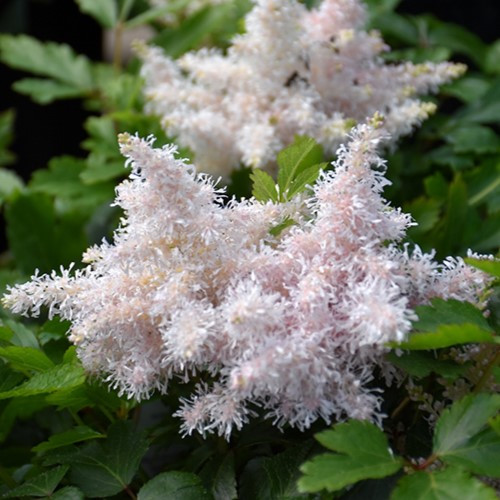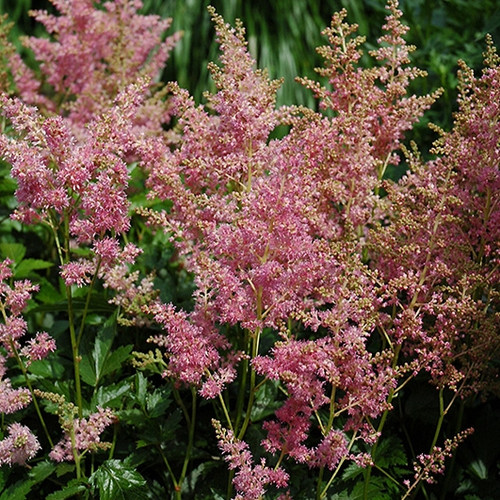| Astilbe 'Sugarberry' |
USDA Zone: 4-9 |
Sugarberry Astilbe has masses of beautiful plumes of shell pink flowers at the ends of the stems from early to mid summer, which are most effective when planted in groupings. The flowers are excellent for cutting. Its small deeply cut ferny compound leaves remain dark green in colour throughout the season.
A floriferous dwarf variety producing lovely shell pink blooms above a very compact clump of glossy foliage; perfect in a shady spot with dappled light; prefers moisture so water regularly for abundant flowers and nice foliage; great for mixed containers.
Sugarberry Astilbe is recommended for the following landscape applications;
- Mass Planting
- Rock/Alpine Gardens
- Border Edging
- General Garden Use
- Container Planting
Bloom Time: Summer
Fragrant Flowers
Bee Friendly
Deer Resistant, Rabbit Resistant
Low Maintenance
Common Name: Astilbe, False Spirea
|
Key Feature
|
Light Needs | Landscape Uses |
 |
 |
|
|
|
|
| More About Sugarberry Astilbe |
| Height: 10 inches |
Spread: 12 inches |
Flower Colour: Pink / White Shades |
|
Water regularly to maintain wet or evenly moist soil. Though they are easy to grow, Astilbes have one critical requirement--lots of water. Plants must have consistently moist soil; dryness leads to a quick demise, especially in sun. Increase watering as the foliage emerges and the plumes mature. If the soil dries out, the leaves will develop brown, crispy margins and will begin to drop. Fertilize Astilbes in late spring before flowering starts. Wait to cut back the old foliage until spring; it will help protect the plant from winter damage. In the spring, if the crown has risen above soil level, gently press it back into the ground and apply some organic matter around the plant. Sugarberry Astilbe is a fine choice for the garden, but it is also a good selection for planting in outdoor pots and containers. With its upright habit of growth, it is best suited for use as a 'thriller' in the 'spiller-thriller-filler' container combination; plant it near the center of the pot, surrounded by smaller plants and those that spill over the edges. It is even sizeable enough that it can be grown alone in a suitable container. Note that when grown in a container, it may not perform exactly as indicated on the tag - this is to be expected. Also note that when growing plants in outdoor containers and baskets, they may require more frequent waterings than they would in the yard or garden. Be aware that in our climate, most plants cannot be expected to survive the winter if left in containers outdoors, and this plant is no exception. NOTE: Some flowers and plants may be harmful or poisonous to people or pets if touched or ingested. If you require more information before placing an order, please let us know in advance. |










